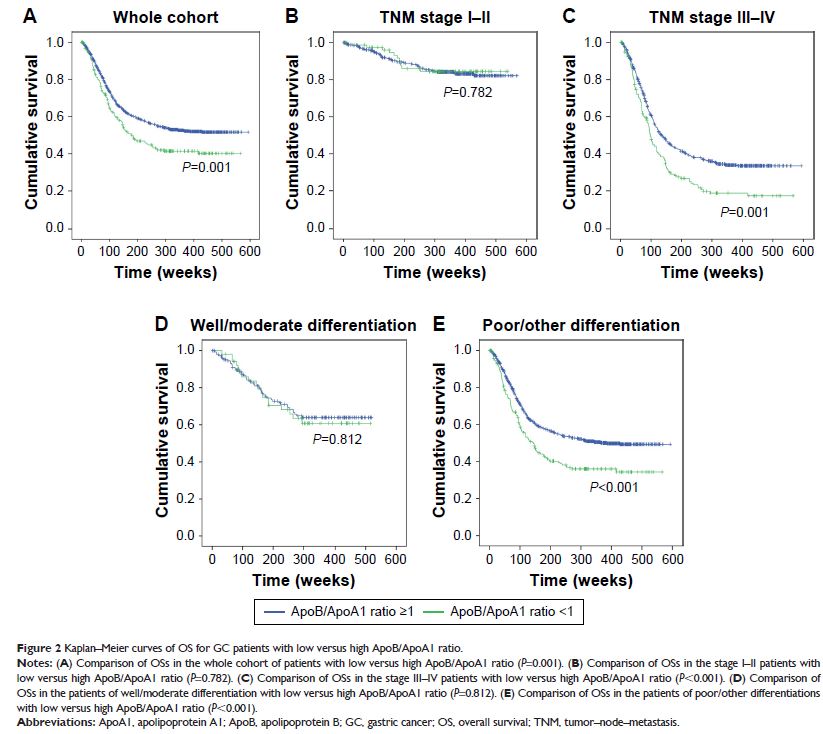108985
论文已发表
注册即可获取德孚的最新动态
IF 收录期刊
- 3.4 Breast Cancer (Dove Med Press)
- 3.2 Clin Epidemiol
- 2.6 Cancer Manag Res
- 2.9 Infect Drug Resist
- 3.7 Clin Interv Aging
- 5.1 Drug Des Dev Ther
- 3.1 Int J Chronic Obstr
- 6.6 Int J Nanomed
- 2.6 Int J Women's Health
- 2.9 Neuropsych Dis Treat
- 2.8 OncoTargets Ther
- 2.0 Patient Prefer Adher
- 2.2 Ther Clin Risk Manag
- 2.5 J Pain Res
- 3.0 Diabet Metab Synd Ob
- 3.2 Psychol Res Behav Ma
- 3.4 Nat Sci Sleep
- 1.8 Pharmgenomics Pers Med
- 2.0 Risk Manag Healthc Policy
- 4.1 J Inflamm Res
- 2.0 Int J Gen Med
- 3.4 J Hepatocell Carcinoma
- 3.0 J Asthma Allergy
- 2.2 Clin Cosmet Investig Dermatol
- 2.4 J Multidiscip Healthc

术前载脂蛋白 B/载脂蛋白 A1 比值:一种新的胃癌预后因素
Authors Ma MZ, Yuan SQ, Chen Y, Zhou ZW
Received 10 November 2017
Accepted for publication 10 January 2018
Published 13 April 2018 Volume 2018:11 Pages 2169—2176
DOI https://doi.org/10.2147/OTT.S156690
Checked for plagiarism Yes
Review by Single-blind
Peer reviewers approved by Dr Colin Mak
Peer reviewer comments 2
Editor who approved publication: Dr Tohru Yamada
Background: The correlations between
lipid profile (lipid molecules and their derivative indexes) and clinical
outcome have been widely testified in many carcinomas, but its prognostic value
remains unknown in gastric cancer (GC). Our purpose in the study was to
comprehensively evaluate the clinical significance of lipid profile in GC.
Methods: We retrospectively collected clinical information of
1,201 GC patients who received surgery at Sun Yat-sen University Cancer Center
from 2005 to 2010. Kaplan–Meier analysis and Cox proportional hazards
regression model were performed to determine its prognostic significance.
Results: Lipid profile including cholesterol,
triglyceride, high-density lipoprotein-cholesterol (HDL-C), low-density
lipoprotein-cholesterol (LDL-C), apolipoprotein A1 (ApoA1), apolipoprotein B
(ApoB), LDL-C/HDL-C ratio, and ApoB/ApoA1 ratio were analyzed. For the first
time, we found ApoB/ApoA1 ratio showed the biggest prognostic potency among all
lipid-related variables and could act as an independent prognostic factor in
GC. Patients with a high ApoB/ApoA1 ratio (≥1) had a shorter overall survival
(hazard ratio: 1.373, 95% confidence interval: 1.123–1.68; P =0.002).
Conclusion: Preoperative serum ApoB/ApoA1 ratio might be
used as a novel prognostic indicator of GC.
Keywords: ApoB/ApoA1
ratio, gastric cancer, prognosis, marker, overall survival
